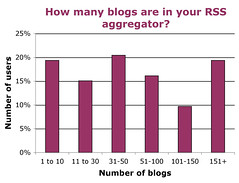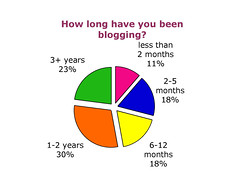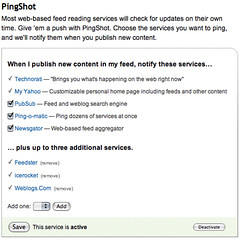In doing research for her book, The Corporate Blogging Book, my colleague and friend Debbie Weil asked a half dozen or so of her blogging colleagues if they wanted to comment on her proposed list of categories for blogs. As she explained it:
“I’m trying to be more creative than saying blogs can be used ‘for marketing and PR and thought leadership, as well as internally for project and knowledge management.'”
Her proposed list includes blogs as a complement to traditional PR, conference blogs, customer evangelist blogs (what today’s NYTimes calls branding blogs), etc.
Where this gets interesting is that I didn’t respond with a expansion of her categories, I responded quite differently, and the subsequent email offers some good insight into how blogs have evolved from a simple system to a proscribed technological communications platform with many specific requirements. I’ll let the email talk for itself.
Here’s what I wrote:
“But blogs are just content management tools, Debbie, so I believe it’s the case that they can be used for an infinite number of different corporate tasks, as many as there are tasks requiring online communication, archiving, or discussion. Anything from a shared discussion space for developers to a space where draft documents can be discussed in the pr group to evaluating logos for a new product in marketing, with the watchful eye of the VP involved.
“I understand your desire to categorize and “taxonomize” but the very act of trying to break it down into discrete parts inevitably changes the nature of what you’re writing about and your reader’s reaction to the material.
“Make sense?”
Rick Bruner then followed up with:
“I’m so glad, Dave, to hear you say “blogs are just content management tools.” I agree completely. I honestly think what’s most remarkable about blogs is the simplicity of the tool, not all the rules people apply to personal voice, whether comments are on or off, etc. At their heart, they are just a means for anyone to self-publish with little hassle.”
Toby Bloomberg offered an even more potentially controversial response:
“I agree with you and Dave; that was why I began talking about blogs to begin with… but then the marketers got their fingers in the virtual pie and the game hasn’t been the same.”
Sally Falkow agreed, with her comment:
“How refreshing to hear these comments. I have been taken to task many times for using blogs in odd ways – and not having all the things a blog is ‘supposed to have”
“I completely agree that a blog can be used for many different things. I have clients who publish news blogs – and now that Yahoo News is indexing blogs their content is being picked up.
“I am also using blogsites as a monitoring tool and it works very well. The RSS feeds are set up to monitor words and phrases and then the analysis is done in the blog so other members of the team and execs can access it. Internal use only, of course.”
Tris Hussey gave an additional thought and added a prediction about the next release of WordPress too:
“Expanding on the blogs as content management theme here … Blog platforms make great, cost-effective platforms for “websites”. If you’re an SMB [small to medium size business -ed] with a limited budget you can get some budget hosting that includes MySQL and have WordPress installed in a few mins. Since WP’s theme and style system is pretty flexible you can cut design cost and time incredibly.
“I’ve been advocating blogs as website solutions for SMBs before, but now even more so. Personally when WP 1.6 comes out I think it’s really going to shake things up in a huge way.”
I’ll let Debbie have the last word:
“Yes, yes and yes. I agree with all of you. I’ve been explaining blogs as a content management tool since 2001. But for the purposes of the book I can’t just say “Oh and you can do anything with a blog.” I need to give examples to make it make sense to readers. And I like to put examples into categories. It’s just a way of packaging the info.”
But what do you think, dear reader? Is a blog simply a tool for managing content on a Web site, or are there a specific and well-agreed-upon set of capabilities and features that it either must or should have to truly be considered a blog in the greater online community?





 Arieanna’s section on the latest bit from our survey—
Arieanna’s section on the latest bit from our survey— A little while ago we launched a survey of Qumana users to better understand both how they are using Q, but also more about them and their blogging. Arieanna’s first post on the results of the survey is really good—
A little while ago we launched a survey of Qumana users to better understand both how they are using Q, but also more about them and their blogging. Arieanna’s first post on the results of the survey is really good—





